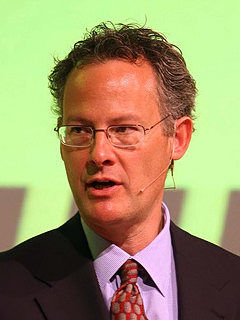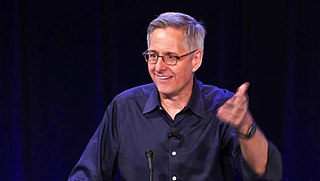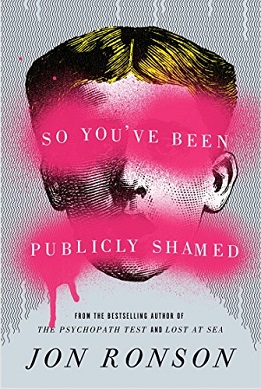
Greil Marcus is an American author, music journalist and cultural critic. He is notable for producing scholarly and literary essays that place rock music in a broader framework of culture and politics.

Jonah Jacob Goldberg is an American neoconservative syndicated columnist, author, political analyst, and commentator. The founding editor of National Review Online, from 1998 until 2019, he was an editor at National Review. Goldberg writes a weekly column about politics and culture for the Los Angeles Times. In October 2019, Goldberg became the founding editor of the online opinion and news publication The Dispatch. Goldberg has authored the No. 1 New York Times bestsellerLiberal Fascism, released in January 2008; The Tyranny of Cliches: How Liberals Cheat in the War of Ideas, released in 2012; and Suicide of the West, which was published in April 2018 and also became a New York Times bestseller, reaching No. 5 on the list the following month.
R. U. Sirius is an American writer, editor, talk show host, musician and cyberculture celebrity. He is best known as co-founder of Mondo 2000 magazine and its original editor-in-chief from 1989 to 1993.

Nicholas G. Carr is an American journalist and writer who has published books and articles on technology, business, and culture. His book The Shallows: What the Internet Is Doing to Our Brains was a finalist for the 2011 Pulitzer Prize in General Nonfiction.

Howard Alan Kurtz is an American journalist and author and host of Media Buzz on Fox News.

Jesse Byron Dylan is an American film director and production executive. He is the founder of the media production company Wondros and Lybba, a non-profit organization. He is also a member of the Council on Foreign Relations and TED. He is the son of musician Bob Dylan and former model Sara Lownds and brother of singer-songwriter Jakob Dylan.

Daniel Lyons is an American writer. He was a senior editor at Forbes magazine and a writer at Newsweek before becoming editor of ReadWrite. In March 2013 he left ReadWrite to accept a position at HubSpot.

Is Google Making Us Stupid? What the Internet Is Doing to Our Brains! is a magazine article by technology writer Nicholas G. Carr, and is highly critical of the Internet's effect on cognition. It was published in the July/August 2008 edition of The Atlantic magazine as a six-page cover story. Carr's main argument is that the Internet might have detrimental effects on cognition that diminish the capacity for concentration and contemplation. Despite the title, the article is not specifically targeted at Google, but more at the cognitive impact of the Internet and World Wide Web. Carr expanded his argument in The Shallows: What the Internet Is Doing to Our Brains, a book published by W. W. Norton in June 2010.

Jonah Richard Lehrer is an American author and blogger. Lehrer studied neuroscience at Columbia University and was a Rhodes Scholar. Thereafter, he built a media career that integrated science and humanities content to address broad aspects of human behaviour. Between 2007 and 2012 Lehrer published three non-fiction books that became best-sellers, and also wrote regularly for The New Yorker and Wired.com.

How We Decide, is a 2009 book by journalist Jonah Lehrer, that provides biological explanations of how people make decisions and offers suggestions for making better decisions. It is published as The Decisive Moment: How the Brain Makes Up Its Mind in the United Kingdom.
Proust Was a Neuroscientist is a non-fiction book written by Jonah Lehrer, first published in 2007. In it, Lehrer argues that many 20th and 21st-century discoveries of neuroscience are actually re-discoveries of insights made earlier by various artists, including Gertrude Stein, Walt Whitman, Paul Cézanne, Igor Stravinsky, and, as alluded to in the title, Marcel Proust.
Michael Christopher Moynihan is an American journalist, former National Correspondent for Vice News and co-host of The Fifth Column podcast. He was previously the cultural news editor for The Daily Beast/Newsweek, the managing editor of Vice magazine, and a senior editor of the libertarian magazine Reason. Moynihan was also a resident fellow of the free-market think tank Timbro in Sweden, where he lived and wrote articles about politics in the country, contributing to Swedish-language publications, including Expressen, Aftonbladet, Sveriges Television, Neo and Göteborgs-Tidningen. According to Media Bistro, "Moynihan is perhaps best known for breaking the story on Jonah Lehrer's fabrications."

Cognitive Surplus: How Technology Makes Consumers into Collaborators is a 2010 non-fiction book by Clay Shirky, originally published in with the subtitle "Creativity and Generosity in a Connected Age". The book is an indirect sequel to Shirky's Here Comes Everybody, which covered the impact of social media. Cognitive Surplus focuses on describing the free time that individuals have to engage with collaborative activities within new media. Shirky's text searches to prove that global transformation can come from individuals committing their time to actively engage with technology. Overall response has been mixed with some critics praising Shirky's insights but also decrying some of the shortcomings of his theory.
The decline effect may occur when scientific claims receive decreasing support over time. The term was first described by parapsychologist Joseph Banks Rhine in the 1930s to describe the disappearing of extrasensory perception (ESP) of psychic experiments conducted by Rhine over the course of study or time. In its more general term, Cronbach, in his review article of science "Beyond the two disciplines of scientific psychology" referred to the phenomenon as "generalizations decay." The term was once again used in a 2010 article by Jonah Lehrer published in The New Yorker.

Quiet: The Power of Introverts in a World That Can't Stop Talking is a 2012 nonfiction book written by American author and speaker Susan Cain. Cain argues that modern Western culture misunderstands and undervalues the traits and capabilities of introverted people, leading to "a colossal waste of talent, energy, and happiness".

Tempest is the 35th studio album by American singer-songwriter Bob Dylan, released on September 10, 2012, by Columbia Records. The album was recorded at Jackson Browne's Groove Masters Studios in Santa Monica, California. Dylan wrote all of the songs himself with the exception of "Duquesne Whistle", which he co-wrote with longtime Grateful Dead associate Robert Hunter.

Maria Popova is a Bulgarian-born, American-based essayist, book author, poet, and writer of literary and arts commentary and cultural criticism that has found wide appeal both for her writing and for the visual stylistics that accompany it.
Baba Shiv grew up in India and is an American marketing professor and an expert in the area of neuroeconomics. He is the Sanwa Bank, Limited, Professor of Marketing at Stanford Graduate School of Business, Stanford University. His work has been featured in The Tonight Show with Jay Leno, CNN, Fox Business, Financial Times, The New York Times and The Wall Street Journal. Shiv received his PhD from Duke University.

So You've Been Publicly Shamed is a 2015 book by British journalist Jon Ronson about online shaming and its historical antecedents. The book explores the re-emergence of public shaming as an Internet phenomenon, particularly on Twitter. As a state-sanctioned punishment, public shaming was popular in Colonial America. Between 1837 in the UK and 1839 in the US, it was phased out as a punishment, not due to the increasingly populous society, as was widely held, but instead in response to rising calls for compassion.














